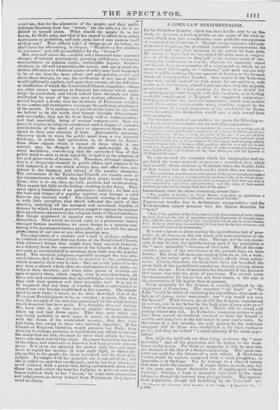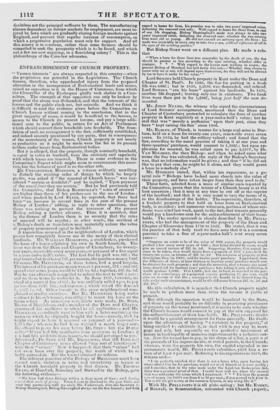A CORN-LAW SENTIMENTALIST.
Iv the l'orkvhire Gazette, which has been kindly sent to us this week, we perceive a leatliois article on our piper of the 10th in- stant, which took Mtn consideration some probable consequences of a repeal of the Corn-laws.* Though using courteous and com- plimentary lenenase, the provincial journalist misrepresents the
aralunents and the plain meaning of the article he deals with.
Ile elle ,sea to fonts that we anticipated the utter ruin or emigra- tion of the lItuvryr in England as the certain result of abo- lishing the leledeeners' In mopaly; whereas we expressly stated our dissent from an assu minim. of a correspondent, which by no means went that length, as " extreme," and gave reasons why there would he not him; like the amount of distress to the farmers which our cerrespoielent dreaded. Any reader of the Yorkshire
paper may sicisfy himself on that point: for our article is, with pe&c: nod raco fairness, placed in juxtaposition with the palpable misstatement. As a last resource for those w to should fail
in tneking aa egnitable bug tin ,vith their laa !lords, or in Ending prolliable employ mow in England, we suggested emigration; well eteeritie that. the excessive connpetitioo, which now enables landlords to 'On unreasonable rents, wouldbr stopped by the removal even III• a smith proportion of the candidates for farms, while the emigrants themselves would reap a rich reward from their enterprise.
Poi. the Ooousoment Of our readers, we quote the following re- (In what was certainly not an unfeeling suggestion- " A It elieat !Vol iner proposes to regenerate the couotry by sending you all at your own efilense whither the commission If aAlooy woull transport yes nt 11,,, public rioql. If this is to be the order of the d ty ; if you are all to be transport,. I f Or the term of yorte natural lives beyoni the seas, awl your wives and ehiPlroa with you. as the recompense for flue mighty cad sweeping robbery committed upon you it berows a fair question, whether it would not be bet- ter for von to perpetrate felonies on others, in order to obtain banishment on more eligible terms, and to choose too the time when you wilt bid farewell to old England for ever."
In order to -well the enormity which his imagination had en- getelered, the writer proceeds to mention a statistical fact, which may possibly obtain credence in Yorkshire when the worthy folks of that county lose the shrewdness for which they are famous- " The merchants, manufacturers, and artisans of the great manufacturinrma commer;ial towns, contflow a comparatively small minority of the whole popu- lation ; their capital is insignificant in value as compared with that one way or other embarked in agriculture and husbandry ; mid the value of their annual products greatly less in amount than that of the other."
Immediately after the above statement, comes this-
" The number of families in Great Britain dependent on agriculture .4 1,193,000; on manufactures 1,581,000; and neutral 718,000."
Figures are terrible foes to declamatory exaggeration ; and the Yorkshireman cannot perceive how his figures demolish his " filets."
"Now, if the question of the Corn laws is really but a choice of evils (whirl we denyl between the ruin of agriculture and the depression of manufactures, who, with the above facts before him, can hesitate which side he would declare for? If one or other must be sacrificed, let it at least be the less numerous and more miserable part of the community."
It is not a question about ruining the agriculturist, but of pros- perity to all classes on the one hand, and semi-starvation to the bulk of the population on the other. Thought not the less nume- rous, it may be that the manufacturing part of the population is the " more miserable "—because of corn-laws. But on the com- parative misery of the two classes at the present time, we have doubts. The farm labourers are earning from Ss. to 10e. a week; which, at the actual price of bread, barely affords them subsis- tence. Clearly, therefore, the Corn-laws have not benefited the great bulk of the agricultural population, though causing misery to other classes. Facts demonstrate the falsehood of the pretence that wages rise with the price of provisions. For several years the remuneration for labour has not been lower, or the cost of the necessaries of life higher than at present.
Great sympathy for the farmers is usually professed by the supporters of Corn-laws. The necessity " my Lord" or " Sir John "would be under of curtailing his expenditure were rents to fall, is, of course, never mentioned ; but " you would nut ruin the farmer !" What farmer, we should like to know, unprotected by a lease, will be the better for the high price of corn next year? Many will be seriously injured by it. Rents will be raised, and perhaps wheat may fall. In Yorkshire, numerous notices to quit have been served by landlords resolved to have the benefit of scarcity and corn-laws to the full extent in next year's rents. la the course of a few months, the only gainers by the nefarious monopoly will be those who established it far their exclusive profit ; and they are indeed " a small minority of the whole popu- lation."
But, while the landlords are thus living in clover, the " more miserable" part of the population will be driven to the work- house or the grave. For them no sympathy is felt, by men who are shocked at the idea of a farmer emigrating, The great ma- jority arc unfit for the labours of a new colony. A hand-loom weaver would be useless, compared with a stout ploughboy, in Australia or at the Cape. Yet he belongs to a class of society that most needs the resource. A single failure in trade, any day in the year, may throw thousands out of employ rnent without warning ; whereas a farm is generally cultivated by the same labourers, though the tenancy may change hands. The agricul- tural population, though not benefiting by the Cora-laws arc
• the Corulaw, what becomes of the l'armir?'1 Spectator Nk.
p. 1065. doubtless not the principal sufferers by them. The manufacturing classes dependent on foreign markets for employment, are most in- jured by laws which are gradually closing foreign markets against England, and prevent that regular increase of consumption, on which a progressive population must rely for support. And all this misery is to continue, rather than some farmers should be compelled to seek the prosperity which is to be found, and which not a few are now enjoying, in a flourishing colony ! This is the philanthropy of the Corn-law advocates.



























 Previous page
Previous page